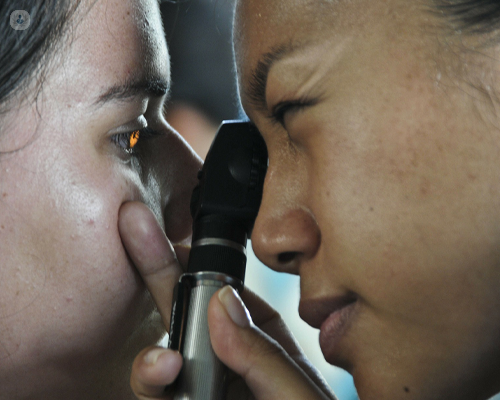Diabetic retinopathy: Understanding the management and treatment options
Autore:Diabetic retinopathy is a condition that affects the eyes and is caused by long-term diabetes. If left untreated, it can lead to severe vision loss and even blindness. In this article, leading consultant ophthalmic surgeon Mr Luke Nicholson discusses the management and treatment options available for diabetic retinopathy.

What is diabetic retinopathy?
Diabetic retinopathy is a complication of diabetes that affects the blood vessels in the retina, the light-sensitive tissue at the back of the eye. High blood sugar levels can damage the blood vessels over time, causing them to leak or become blocked. This can lead to a variety of eye problems and vision impairment.
Can diabetic retinopathy be cured?
Unfortunately, diabetic retinopathy cannot be cured. However, with proper management and treatment, the progression of the disease can be slowed down, and the risk of vision loss can be significantly reduced. Early detection and intervention are crucial for successful management.
How is diabetic retinopathy managed?
The management of diabetic retinopathy involves a combination of lifestyle changes, regular eye exams, and various treatment options. Here are some key aspects of managing this condition:
-
Blood sugar control
Maintaining good control of your blood sugar levels is essential in managing diabetic retinopathy. This can be achieved through a combination of diet, exercise, and medication as prescribed by your diabetes care team. Keeping your blood sugar within a target range can help reduce the risk of further damage to the blood vessels in your eyes.
-
Blood pressure and cholesterol management
Controlling your blood pressure and cholesterol levels is equally important. High blood pressure and elevated cholesterol can worsen diabetic retinopathy. Regular monitoring and appropriate treatment, as advised by your healthcare provider, can help prevent or slow down the progression of the disease.
-
Regular eye exams
People with diabetes should undergo regular eye exams to detect and monitor any changes in their retina. These exams typically include a dilated eye examination, where the eye doctor will examine the back of the eye for signs of retinopathy. Early detection allows for timely intervention and better outcomes.
-
Laser treatment
Laser treatment, also known as photocoagulation, is a common treatment option for diabetic retinopathy. It involves using a laser to seal leaking blood vessels or to shrink abnormal blood vessels in the retina. This procedure can help prevent further vision loss and sometimes improve vision.
-
Intravitreal injections
In some cases, intravitreal injections may be recommended. These injections deliver medication directly into the vitreous gel of the eye, targeting specific areas of the retina. Medications such as anti-VEGF agents can help reduce the growth of abnormal blood vessels and decrease swelling in the retina.
-
Vitrectomy
Vitrectomy is a surgical procedure that may be considered for advanced cases of diabetic retinopathy. It involves removing the vitreous gel and replacing it with a clear solution. This procedure can help improve vision by removing scar tissue and blood that may be blocking the visual pathway.
How important is it to get an early diagnosis for diabetic retinopathy?
Diabetic retinopathy is a serious eye condition that requires careful management to prevent vision loss. While it cannot be cured, the progression of the disease can be slowed down and its impact minimised through a combination of lifestyle changes, regular eye exams, and various treatment options.
It is essential for individuals with diabetes to work closely with their healthcare team, including ophthalmologists, to ensure proper management and reduce the risk of complications. Remember, early detection and intervention play a crucial role in preserving your vision and overall eye health.
If you’re concerned you have diabetic retinopathy, arrange an expert consultation with Mr Nicholson via his Top Doctors profile.


